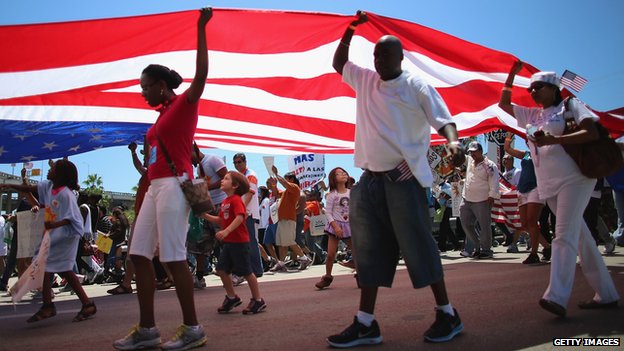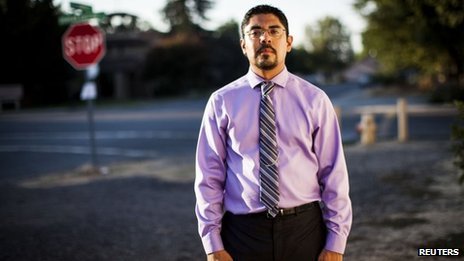The nine-to-five crowd had thinned out by the time a mostly Latino crowd arrived outside the Immigration and Customs Enforcement (ICE) processing center here to mark the end of a 15-day hunger strike this week.
Weakened by the lack of food, strike participants sat in wheelchairs, surrounded by friends and family, under a sidewalk canopy. They had fasted to call attention to the Obama administration‘s deportations and the detention of spouses, children, and siblings, many of whom remain behind bars for being in the country illegally. On Monday, the hungry group savored a bowl of vegetable soup and promised continued protests.
“This doesn’t stop here, we will keep at it,” says Anselma López, a Guatemala native who was briefly hospitalized for health complications after several days of not eating.
With hope fading over Congress’s capacity to tackle immigration reform anytime soon – a bipartisan reform bill passed the Senate last June but has stalled in the GOP-controlled House – pro-immigrant tactics to pressure the Obama administration to act are escalating.
Protesters want the president to use his executive powers to end deportations, until Congress can overhaul immigration laws and establish a path to legal status for some 11 million people now in the country illegally.
Critics call the fasts and vigils “protest theater” that aims to stir up emotion but doesn’t fit how federal agents are enforcing the nation’s immigration laws on the ground.
“The kind of enforcement that the activist groups are upset about is interior enforcement, where people living here get caught and get removed,” says Jessica Vaughan, director of policy studies for the Center for Immigration Studies in Washington, which promotes tighter immigration enforcement. “But that kind of enforcement has dropped 40 percent in the last two years.”
The outcry clearly indicates mounting frustration that “a big amnesty” has yet to materialize, she says. “I wonder if the Obama administration might use these demonstrations to further reduce deportations or widen the administrative amnesties that have already been implemented.”
In Arizona, activists in Phoenix and Tucson have chained themselves to ICE buildings and buses carrying deportees, after immigration reform stalled in the House last July. Similar protests later temporarily derailed ICE operations in Chicago, San Francisco, and Fairfax, Va. Along US-Mexico border crossings, young activists who were deported or left the country on their own in July began testing immigration laws by requesting asylum en masse.
Young men and women in the country unlawfully also have surrendered to authorities with the aim of spending time in immigration detention centers across the country, including one in El Paso, Texas, in November and another near Detroit. Once inside, they document cases of inmates who might be eligible for release.
“We have tried everything, so now it’s really putting our bodies in the front lines,” says Erika Andiola, a prominent immigration activist in her mid-20s, who was arrested for trespassing while lending support to the strikers. She and two other protesters spent a night in jail.
Although the acts of disobedience vary from state to state, a national campaign dubbed “Not One More Deportation,” organized by the National Day Laborer Organizing Network, is sponsoring events to stop expulsions until political winds shift in favor of overhauling immigration laws. On April 5, activists plan to launch an “All Out in the Streets” day of action, including more hunger strikes and marches and sit-ins outside the White House and in other parts of the country.
Protesters blame the Obama administration for about 2 million deportations that they say frequently snare immigrants who lack legal status but are otherwise law-abiding or charged with minor crimes. These deportations, they say, go against 2011 enforcement guidelines that prioritize the arrest and expulsion of serious offenders.
While they credit the president’s move in 2012 to defer deportation for young immigrants who grew up in the US, they also view the volume of deportations as proof that many others who might be eligible to stay in the country one day now routinely get pushed out.
“There’s no way there are that many hard-core criminals being deported every day,” says Carlos Garcia, a leading organizer of the Phoenix hunger strike and director of Puente Arizona, a grassroots organization here.
But Ms. Vaughan, at the Center for Immigration Studies, says that criticism of the Obama administration for being too aggressive in enforcing immigration laws is misleading. An ICE directive issued on June 2011 orders agents not to arrest minor criminals, long-time residents, students, parents, caregivers, she writes. For none of these categories is there any “statutory basis for special treatment.”
Moreover, the record of deportations by the Obama administration from 2009-12 averages about 800,000 a year. That compares with 1.3 million a year for President George W. Bush and 1.5 million for President Clinton (the record). The closest comparison for Obama’s record is the Ford administration (1974-76), at 804,000, “when there were a lot fewer people living in the country illegally,” she says.
Perhaps in response to the rising criticism, the federal government in fiscal 2013, for the first time, broke down data that reports deportations from the US interior as well as along the border. The numbers, the most recent available, show that through Sept. 30 authorities deported 368,644 people, a 10 percent decrease from the previous year and the lowest numbers since Obama assumed office in January 2009. Of those, 133,551 occurred in the interior.
About 60 percent of all deportees had criminal convictions, according to the data, which include no details on the type of offenses committed.
Still, for Ms. Andiola and other protesters, the immigration battle is personal. She benefited from Obama’s Deferred Action for Childhood Arrivals program that suspends deportation for those brought here as children, either unlawfully or on visas that families overstayed. She now has a work permit and a Social Security card. But until her mother, Maria, and other relatives who have had run-ins with immigration authorities can legalize their US status, she vows to keep demonstrating.
“We’re going to make sure that President Obama knows that the Latino community is no longer going to be fooled by more promises,” Andiola adds. “We will escalate as much as we need.”
The president maintains that it is Congress, not he, who has the power to make significant changes to the immigration system. His stance is eroding support among former allies. This week, the National Council of La Raza, the country’s largest Latino advocacy group, joined a growing chorus calling the president “deporter-in-chief.”
On Wednesday, as Obama pushed for a minimum wage hike at a Central Connecticut State University gym, protesters outside carried signs that demanded an end to deportations as they shouted a familiar chant: “Obama, Obama, don’t deport my mama!”
In Phoenix, Ms. López, who has a 30-year-old son in long-term detention, says she abstained from eating as an act of desperation because he is set to be deported. Like her, most of those who went hungry speak of having a relative who was either expelled from the country or soon will be.
Roxana Abundes, whose family is of mixed status with some members being US citizens and others Mexican nationals, daily visited those on hunger strike to offer encouragement. She empathizes because a brother and her husband, both here illegally, were nabbed during a work raid recently and jailed for more than three months before being released.
The status of her relatives prompted her to seek guidance from an advocacy group and she has been involved in demonstrations ever since. Her brother and husband have since secured work permits, Ms. Abundes adds. But she hopes that the hunger strikes and protests around the country will help bring about, if not full immigration reform, some special programs that will allow her family and others in their situation to stay in the US permanently.
“It’s a bit disheartening that we keep struggling for change but get no response,” she says.
Related stories
Read this story at csmonitor.com
Become a part of the Monitor community
- Politics & Government
- Immigration Issues
- immigration reform
- immigration laws



